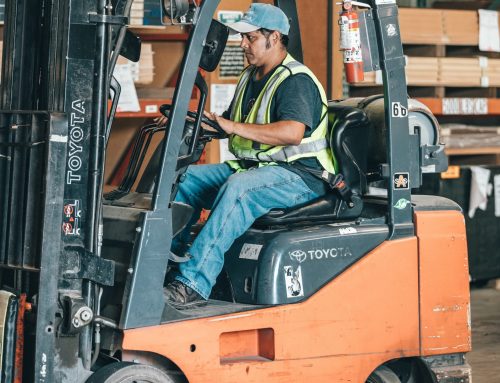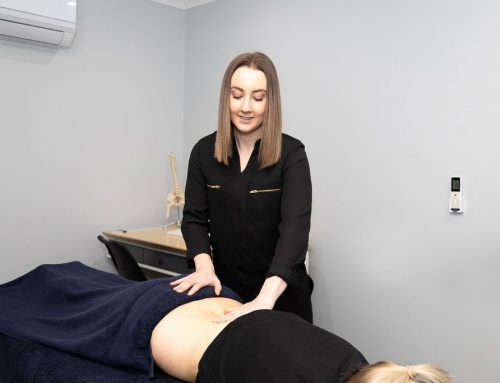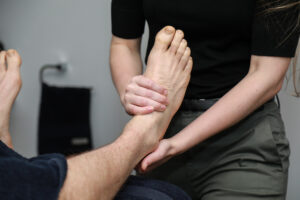 Plantar fasciitis is such a pain in the.. heel! It can be hard enough getting out of bed early in the morning, but when you’ve got sharp pain with the first few steps getting up, then it can be even more of a nuisance. Plantar fasciitis is reported to be the most common cause of chronic inferior heel pain and can significantly affect a person’s daily activities.
Plantar fasciitis is such a pain in the.. heel! It can be hard enough getting out of bed early in the morning, but when you’ve got sharp pain with the first few steps getting up, then it can be even more of a nuisance. Plantar fasciitis is reported to be the most common cause of chronic inferior heel pain and can significantly affect a person’s daily activities.
The plantar fascia is a band of connective tissue spanning from the heel to the toes and acts to support the arch of your foot. Pain and injury to the plantar fascia can begin traumatically, however is most commonly caused by overuse stresses. So are you at risk? Here’s some things that can contribute to the development of plantar fasciitis.
Risk Factors:
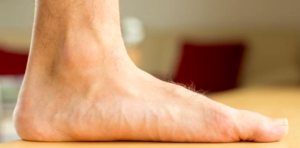
- Flat feet
- Poor footwear
- An increase in training loads or time on feet
- Being overweight
What to expect if you have plantar plantar fasciitis:
- Pain on the underside of your heel and/or arch
- Sharp pain upon the first few steps after getting out of bed in the morning
- Initially, pain that is worse when walking after periods of rest (sitting at your desk)
- Later stages, pain that becomes more constant while walking
There are many challenges when it comes to managing plantar fascia pain and just like chronic low back pain patients, many individuals experience extreme physical and mental distress.
Why see an osteopath for you plantar fasciitis?
1) QUALIFICATIONS & TRAINING
Osteopathy is one of the fastest growing healthcare professions in Australia. Osteopaths have 5 years of University training under their belt where they learn to master the difficult task of assessing, diagnosing, treating and managing musculoskeletal injury. Naturally, there is a heavy focus on common conditions such as plantar fasciitis because common conditions occur commonly. For that reason, we see plantar fasciitis all too often and understand what it takes to correctly diagnose and manage you back towards a healthy heel.
2) THOROUGH HISTORY & ASSESSMENT
An initial consultation with our osteopaths are 60 minutes long to ensure your story is heard. Our osteopaths will take the time to listen and formulate the history of your heel pain and how it is affecting your quality of life. A thorough assessment is then carried out to accurately diagnose the cause of your heel pain and assess for any predisposing factors you may have. Identifying the reason you may have developed plantar fasciitis allows for individualised treatment plans and a better chance at long term success.
3) HANDS ON TREATMENT APPROACH
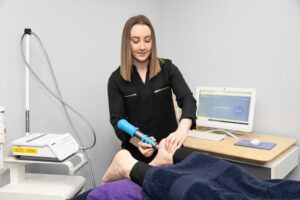 Pain and disability is the most common symptom of plantar fasciitis and the most common reason people seek osteopathic treatment for the condition. Therefore, there’s no surprise that Osteopaths continue to employ a hands on approach to help decrease pain and get you moving better. There are a vast range of hands on techniques that an Osteopath will use including:
Pain and disability is the most common symptom of plantar fasciitis and the most common reason people seek osteopathic treatment for the condition. Therefore, there’s no surprise that Osteopaths continue to employ a hands on approach to help decrease pain and get you moving better. There are a vast range of hands on techniques that an Osteopath will use including:
- Soft tissue massage
- Joint mobilisation
- Joint manipulation
- Rigid and kinesio taping
- Dry needling (to learn more about this technique click here)
- Shockwave Therapy (to learn more about this technique click here)
At Pakenham Osteopathy all of our practitioners are trained to use radial shockwave therapy – a therapy that involves a state of the art piece of equipment shockwave machine. Shockwave has been used over the past decade to treat Olympic athletes and AFL players. It involves the transmission of sound waves pulsing through a hand held applicator into the affected tissue. This helps to:
- Reduce pain
- Increase blood circulation
- Stimulate a healing process by triggering stem cell activation
4) INDIVIDUALISED TREATMENT PLAN
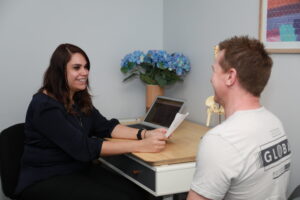 We, as osteopaths, believe that patient understanding into their cause of pain and management is vital. That is why we take the time to explain your pain and provide you with a written management plan outlining your diagnosis, expected recovery time and anything else that is required to reach your goals. This way, we avoid leaving patients confused, worried or isolated.
We, as osteopaths, believe that patient understanding into their cause of pain and management is vital. That is why we take the time to explain your pain and provide you with a written management plan outlining your diagnosis, expected recovery time and anything else that is required to reach your goals. This way, we avoid leaving patients confused, worried or isolated.
5) HOLISTIC APPROACH
We believe in long term success and therefore take on a holistic approach to your injury by not only treating your pain, but also addressing the root cause of your problem. This will reduce the likelihood of pain returning in the future so that you can live a healthy and active life moving forward.
SUMMARY
Plantar fascia pain can be very frustrating, but we have the skills and experience to get you back on track. With a state of the art shockwave machine at our disposal, in conjunction with manual and exercise therapy techniques, we certainly have a vast array of osteopathy treatment options.
While very common, we understand that everyone’s pain is different, and everyone has different goals. We, as osteopaths, strive to treat the person, not just the injury. Whether your goals are to run marathons, muck around with the kids or retain your independence in retirement, we take them very seriously (while always having a laugh in the treatment room at the same time!). These goals help us form the basis of our individualised management plan to ensure that together, as a team, we are able to get you back doing the things that you love.

